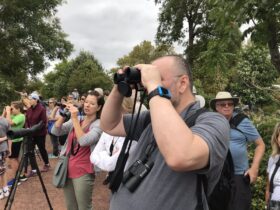The shingles vaccine can not only protect older adults from a painful virus, but it might also help reduce the risk of dementia, Hackensack University Medical Center said, citing a Stanford Medicine study published in Nature on April 2.
Manisha Parulekar, M.D., FACP, AGSF, CMD, director of the Division of Geriatrics at Hackensack University Medical Center and co-director of the Center for Memory Loss and Brain Health at Hackensack University Medical Center, specializes in memory and cognitive disorders. She says although more research is needed to confirm the potential link between the shingles vaccine and a reduction in dementia, and understand the full extent of its protective effects, one theory is that it may reduce inflammation in the nervous system.
“Here’s what we know, varicella-zoster virus (VZV), the virus that causes chickenpox and shingles, remains dormant in the nervous system after chickenpox,” said Dr. Parulekar, explaining that reactivation later in life causes shingles, a painful rash.
“This reactivation can trigger significant inflammation in the nervous system, potentially damaging neurons and contributing to cognitive decline,” she added.
How the Research Unfolded
Pascal Geldsetzer, MD, PhD, senior author of the study and assistant professor of medicine at Stanford, along with co-lead authors Markus Eyting, PhD, and Min Xie, PhD, postdoctoral scholars in primary care and population health, based their research on a Sept. 1, 2013 shingles vaccination rollout in Wales.
Eligibility for the Zostavax vaccine in Wales required residents be age 79 on Sept. 1, 2013. Seniors who were 80 or older on that date, “were out of luck — they would never become eligible for the vaccine,” according to a Stanford Medicine press release about the study.
They analyzed the health records of more than 288,000 adults aged 71 to 88, who did not have dementia as of Sept. 1, 2013. Then, across the next seven years, the researchers compared the health outcomes of people closest in age who were eligible and ineligible to receive the vaccine. They focused on people who turned 80 in the week before Sept. 1, 2013 compared with those who turned 80 in the week after.
“What makes the study so powerful is that it’s essentially like a randomized trial with a control group — those a little bit too old to be eligible for the vaccine — and an intervention group — those just young enough to be eligible,” Geldsetzer said.
What the Research Showed
After accounting for the fact that not all those eligible for the vaccine received it, researchers found vaccinations led to a 20% reduction in dementia risk.
By 2020, seven years after the initial start of the vaccination program, one in eight older adults, who were by then 86 and 87, had been diagnosed with dementia, according to Stanford. But those who received the shingles vaccine were 20% less likely to develop dementia than the unvaccinated.
Seven years of research comparing outcomes indicated that seniors who had the vaccine were less likely to be diagnosed with dementia compared to those who did not get the shot. The effects were seen strongest in female patients.
What is Dementia?
Dementia is not a single disease, but rather a term for brain diseases associated with memory loss, decreased cognitive function and changes in behavior, as seen in Alzheimer’s Disease.
Some statistics about dementia:
- ◾Affects 55 million globally
- ◾10 million new cases worldwide each year
- ◾One in three will develop dementia in their lifetime
- ◾Certain medicine may slow progression, but there is no cure
At HUMC, Dr. Parulekar helps patients struggling with dementia and their families through the health network’s Center for Memory Loss and Brain Health. Her team of specialists and supportive staff help families navigate treatment for the difficult diagnoses and connect them with helpful resources.
“The number of New Jersey residents diagnosed with Alzheimer’s Disease is expected to jump to 210,000 this year. That’s a 23% increase over 2017 figures,” says Dr. Parulekar.
While patients and families may feel helpless, asking how this devastating disease can be prevented, this new study may offer a glimmer of hope and a potential new direction in the fight against it.
“This study reinforces the growing body of evidence pointing to the role of inflammation in the brain as a driver of neurodegenerative diseases like Alzheimer’s,” explains Dr. Parulekar.
“If inflammation is indeed a key player, then targeting it through various means, including vaccination, could be a promising avenue for prevention or treatment,” she said.












